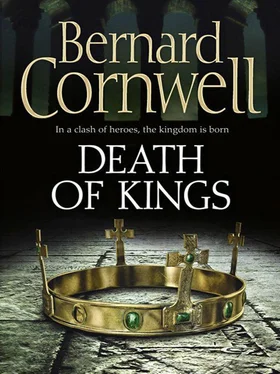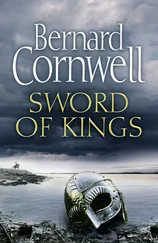‘You believe Brunna?’
‘She resents her husband, so yes, I believe her.’
‘What is Ælfadell saying these days?’ I asked.
‘She’s saying what Cnut tells her to say, that the attack will come from the east and that Wessex will fall.’ He sighed. ‘I wish I could live long enough to see the end of this, lord.’
‘You’re good for another ten years, Offa,’ I told him.
He shook his head. ‘I feel the angel of death close behind me, lord.’ He hesitated. ‘You’ve always been good to me, lord.’ He bowed his head. ‘I owe you for your kindness.’
‘You owe me nothing.’
‘I do, lord.’ He looked up at me and, to my surprise, there were tears in his eyes. ‘Not everyone has been kind to me, lord,’ he said, ‘but you have always been generous.’
I was embarrassed. ‘You’ve been very useful,’ I muttered.
‘So in respect for you, lord, and in gratitude to you, I give you my last advice.’ He paused and to my surprise pushed the coins back towards me.
‘No,’ I said.
‘Give me the pleasure, lord,’ he said. ‘I want to thank you.’ He pushed the coins still closer to me. A tear rolled down his cheek and he cuffed it away. ‘Trust no one, lord,’ he said softly, ‘and beware Haesten, lord, beware the army in the west.’ He looked up at me and dared touch my hand with a long finger. ‘Beware the army at Ceaster, and don’t let the pagans destroy us, lord.’
He died that summer.
Then the harvest came, and it was good.
And after it the pagans came.
I worked it out later, though the knowledge was small consolation. A war-band rode to Natangrafum and because so many of the warriors were Saxons no one thought their presence strange. They arrived on an evening when the tomb was empty, because by then the peace had lasted so long that the angels rarely appeared, but the raiders knew exactly where to go. They rode directly to the Roman house outside Turcandene where they took the handful of guards by surprise and then killed fast and efficiently. When I arrived the next day I saw blood, a lot of blood.
Ludda was dead. I assumed he had tried to defend the house, and his eviscerated body lay sprawled across the doorway. His face was a grimace of pain. Eight others of my men were dead, their bodies stripped of mail, arm rings and anything else of value. On one wall, where the Roman plaster still clung to the bricks, a man had used blood to make a crude drawing of a flying raven. The drips had run down the wall and I could see the print of the man’s hand beneath the raven’s savagely hooked beak. ‘Sigurd,’ I said bitterly.
‘His symbol, lord?’ Sihtric asked me.
‘Yes.’
None of the three girls was there. I supposed the attackers must have taken them, but they had failed to find Mehrasa, the dark girl. She and Father Cuthbert had hidden in some nearby woods and only emerged when they were certain it was my men who now ringed the slaughterhouse. Cuthbert was crying. ‘Lord, lord,’ was all he could say to me at first. He fell to his knees in front of me and wrung his big hands. Mehrasa was steadier, though she refused to cross the house’s blood-reeking threshold where the flies buzzed around Ludda’s opened gut.
‘What happened?’ I asked Cuthbert.
‘Oh God, lord,’ he said, his voice quavery.
I slapped him hard around the face. ‘What happened?’
‘They came at dusk, lord,’ he said, his hands shaking as he tried to clasp them, ‘there were a lot of them! I counted twenty-four men,’ he had to pause, he was shaking so much and when he next tried to speak he just made a mewing noise. Then he saw the anger on my face and took a deep breath. ‘They hunted us, lord.’
‘What do you mean?’
‘They searched around the house, lord. In the old orchard, down by the pond.’
‘You were hidden.’
‘Yes, lord.’ He was crying and his voice was scarce above a whisper. ‘Saint Cuthbert the Cowardly, lord.’
‘Don’t be a fool,’ I snarled, ‘what could you do against so many?’
‘They took the girls, lord, and killed everyone else. And I liked Ludda.’
‘I liked Ludda too,’ I said, ‘but now we bury him.’ I did like Ludda. He was a clever rogue and he had served me well, and worse, he had trusted me and now he was cut from the groin to the ribs and the flies were thick about his entrails. ‘So what were you doing while he died?’ I asked Cuthbert.
‘We were watching the sunset from the hill, lord.’
I laughed without mirth. ‘Watching the sunset!’
‘We were, lord!’ Cuthbert said, hurt.
‘And you’ve been hiding ever since?’
He looked around at the red mess and his body shook with a sudden spasm. He vomited.
By now, I thought, the two angels would have confessed the whole deception and the Danes were laughing at us. I looked north and east for smoke in the sky, the sure sign that a war had broken out, but I saw none. The temptation was to assume that the killers had been a small raiding party who, their revenge taken, had headed back to safer land, but was the raid just that? A revenge for the ships of Snotengaham? And if it were such a revenge, how did the raiders know the angels were my idea? Or was Plegmund’s peace breaking into a thousand bloody pieces? The raiders had not fired the Roman building, suggesting they did not want to draw attention to their presence. ‘You say there were Saxons among the war-band?’ I asked Cuthbert.
‘I heard them talking, lord,’ he said, ‘and yes, there were Saxons.’
Æthelwold’s men? If it was Æthelwold’s followers then it was surely war, and that meant an attack from Ceaster if Offa was right. ‘Dig graves,’ I told my men. We would begin by burying our dead, but I sent Sihtric and three men back to Fagranforda. They carried orders that my whole household should retreat into Cirrenceastre, and to take the livestock with them. ‘Tell the Lady Æthelflaed she’s to go south into Wessex,’ I said, ‘and tell her to pass the news to Æthelred and to her brother. Make sure King Edward knows! Tell her I need men, and that I’ve gone north towards Ceaster. Have Finan bring every man here.’
It took a day to assemble my men. We buried Ludda and the others in Turcandene’s churchyard and Cuthbert said prayers over the fresh mounds. I still watched the sky and saw no great plumes of smoke. It was high summer, the sky a clear blue in which lazy clouds drifted, and as we rode north I did not know whether we rode to war or not.
I only led a hundred and forty-three men, and if the Danes were coming then I could expect thousands of them. We rode first to Wygraceaster, the northernmost burh in Saxon Mercia, and the bishop’s steward was surprised by our arrival. ‘I’ve heard no news of a Danish attack, lord,’ he told me. The street outside the bishop’s large house was busy with a market, though the bishop himself was in Wessex.
‘Make sure your storehouses are full,’ I told the steward, who bowed, but I could see he was unconvinced. ‘Who commands the garrison here?’ I asked.
It was a man called Wlenca, one of Æthelred’s followers, and he bridled when I told him to assume the war had started. He looked north from the burh’s ramparts and saw no smoke. ‘We’d have heard if there was war,’ he said in a surly tone, and I noted he did not call me ‘lord’.
‘I don’t know if it has started or not,’ I confessed, ‘but assume it has.’
‘Lord Æthelred would send me notice if the Danes attacked,’ he insisted loftily.
‘Æthelred’s scratching his arse in Gleawecestre,’ I said angrily. ‘Is that what you did when Haesten invaded last?’ He looked at me angrily, but said nothing. ‘How do I reach Ceaster from here?’ I asked him.
Читать дальше
Конец ознакомительного отрывка
Купить книгу












